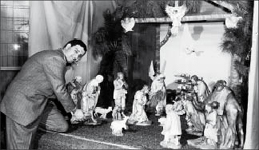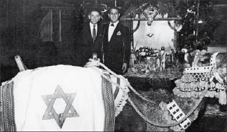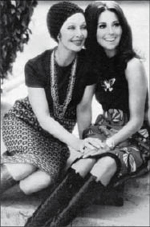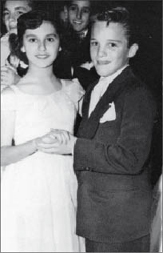Growing Up Laughing: My Story and the Story of Funny (9 page)
Read Growing Up Laughing: My Story and the Story of Funny Online
Authors: Marlo Thomas
Marlo:
In what way?
Chris:
When you’re in a club, you can do a quilt of jokes and get away with it. You can go from joke to joke to joke, and do that for fifty minutes—people are pretty impressed by that, and it’s a fine feat. But if you’re at Radio City Music Hall or Madison Square Garden, you have to have a
show
.
Marlo:
Right.
Chris:
You’re standing in the same spot Prince was two nights earlier. And your ticket price isn’t that much different from his. So it can’t just be joke, joke, joke, joke, joke, joke, joke, joke. I mean, you have to get the laughs from the joke, joke, joke, but it’s got to be more like a movie. And the houses help. I mean, you’re not competing with a waitress, and it’s all set up for you. So you should take that extra time and really use it to get that extra laugh.
Marlo:
In a way, you’re a lot like Lenny Bruce. He was very shocking at the time, mostly because of his language. But when you look back at it now, what he was basically saying to people was: “Wake up! Look at what’s going on in this country and in this world.” You do that, too.
Chris:
I try. I’ve seen Lenny Bruce. This YouTube invention is the greatest thing of all time—punch up any comedian you want. Sometimes I’ll sit for hours, just watching comics.
Marlo:
What do you learn from them?
Chris:
That the times can dictate a comedian’s impact—that the years in which someone is doing comedy can help the comedian as much as anything else. Richard Pryor is great, don’t get me wrong, but the times he was performing in—my God! How could you mess up in that era? Look at what the country was going through then. How could you not be great during segregation? Then you’ve got a guy like Eddie Murphy, who’s great, but it wasn’t really a deep time when he was on stage. By the eighties, the struggle was over for the most part, you know what I mean? It was a different time. Lenny Bruce was part of such a great time. Probably no comedian has been of a better time, really.
Marlo:
You seem to have no trouble finding social issues to talk about, either. I laughed hard at your piece about blacks and Jews, where you say that blacks don’t hate Jews, they hate
white people
. You talk about not putting everyone in little categories, which allows us to laugh at our own prejudices. That’s a very brave and honest thing to say, and it helps to bang down doors. You also did a very strong piece about “blacks versus niggers,” which you’ve since retired. Why?
Chris:
I’m always retiring stuff. That’s the downside of the YouTube era; people can watch your act at any moment, and you can’t be up there doing old stuff. You used to be able to write an act then ride that act for twenty years.
Marlo:
That’s what my dad and all those guys of his era did. Tell me about school. Were you the funny kid?
Chris:
No, I barely spoke. I was bused to school, and was the only black boy in my grade for five or six years—there were two girls. It was scary, but that’s what was going on in ’73. You could still be the first black kid somewhere, even in the seventies.
Marlo:
So if you weren’t funny at school, when did you start figuring out you could make people laugh?
Chris:
I was always interested in being funny. I was a weird kid. I remember I could watch any TV show and tell you exactly what the next joke was.
Marlo:
Really?
Chris:
Really. Even when I was eight years old, I would watch a brand-new show and say, “Okay, now they’re going to say this . . .” And I always loved comedians. I couldn’t wait to see
The Dean Martin Roast
. What kid wants to watch a Dean Martin roast? Couldn’t wait. And I loved Alan King. Black kid in Bed Stuy worshipping Alan King.
Marlo:
What about your uncles? You once said that uncles prepare you for life.
Chris:
They do.
Marlo:
That there’s the alcoholic uncle, and the gay uncle, and the stealing uncle. Did you observe this in your own family?
Chris:
Yeah, all those uncles. I have an uncle who’s a surgeon, too, but, you know, that’s not funny. He always gets left out.
Marlo:
You talk a lot about men and women on stage. You say, “When you meet somebody, you’re actually only meeting their
representative,
because all men lie, and all women have hair extensions, makeup, and heels.” That kind of comment could be offensive, especially to women, but the women in your audiences really seem to love it. How do you do that?
Chris:
You’ve got to include the women in on the joke.
Marlo:
Meaning?
Chris:
Meaning, when I’m on stage doing relationship stuff, I’m essentially a woman comedian.
Marlo:
Ah-hah.
Chris:
There are very few jokes I do on relationships that a woman couldn’t do. I remember Martin Lawrence once telling me that, unless you’re AC/DC, there’s always going to be more women in the crowd.
Marlo:
Really?
Chris:
Yeah. And so you want jokes that get the hard laughs, not just the cute laughs—because most humor that’s directed towards women is kind of cutesy. Some comedians assume that the women at their shows were dragged there by men, but I approach the women in my audiences as if they actually came to see me. Because women like to laugh hard, too.
Marlo:
We sure do. In watching your concerts, what I found most shocking was your take on O. J. Simpson. You actually make the argument that you understood why he may have committed murder. You run through the whole thing—he’s paying twenty-five thousand a month in alimony, another guy is driving his car, he’s paying the mortgage and the guy is coming to his house. You say, “He shouldn’t have killed her—but I understand.” I was floored by that. Weren’t you afraid people would stone you for saying a thing like that?
Chris:
It’s funny, I never had any problems with that joke. With lots of jokes, it’s like, “Oh, man, I’ve got to figure out how to get this one right.” Like the niggers and black thing. When you don’t have that joke right, it’s the worst joke ever. I was dying every night. People were walking out, cursing me out. But never with the O.J. joke. Everybody laughs at it. And the important thing is, even
women
laugh at it because . . .
Marlo:
Because they understand jealousy?
Chris:
Yeah, and let’s not kid ourselves here. We’re not supposed to murder, but let’s not act like none of us ever thought about killing somebody. I mean, most of us have a switch that says
you can’t do that
. O.J.’s switch did not go off that day.
Marlo:
So, in a way, that gives you the license to do a joke like that.
Chris:
Right.
Marlo:
Which a lot of other comedians might shy away from.
Chris:
Look, when you listen to the news, you realize that it’s so much easier to report things as black or white. But the world is not black and white. The world is grey.
T
he words
Beverly Hills
conjure up Rodeo Drive, Hollywood and glamour. But for the kids who grew up there, it was just our neighborhood.
Well, maybe it
was
an odd hood to grow up in. Louella Parsons, the famous gossip columnist who, like all gossips, was known to write (make up?) items that could be hurtful—personally and professionally—lived across our alley on Maple Drive. She and her assistant, Dorothy, would take a walk around the block every afternoon at about five. My mother did not want to have any interaction with Louella, for fear of giving her something to
misinterpret
. So the minute she saw them approaching, she would quickly dart inside. We kids even avoided Louella’s house on Halloween. In our neighborhood, she was the all-year-round witch.
But that didn’t stop us from going to all the other houses on our street. We’d dress up in our costumes, many borrowed from studio wardrobe, and toddle up and down Elm Drive, clutching our little bags with dreams of candy apples in our heads.
Some of our neighbors didn’t quite have the Halloween spirit. At Robert Young’s house, we were given autographed 8 × 10 glossy pictures of him—and that’s all. So, of course, we did what any group of right-minded, candy-deprived American kids would do—we soaped his windows.
Edward G. Robinson always had all his lights off, and never answered the door. But we knew he was home—we could see a TV flickering in a back room—so we soaped his windows, too (and anything else soap would stick to).
Elizabeth Taylor’s mom was nice, and she gave out good cookies. They lived just three doors up from our corner house on Elm, on the opposite side of the street. So we had a good view of Elizabeth as she came out the door, looking so beautiful, on the day she married Nicky Hilton at Good Shepherd Church.
Good Shepherd was where everything took place for the Catholics in our neighborhood. We made our First Communions there, we were confirmed there, my sister and brother both had their weddings there, and we had the funeral masses for Mom and Dad there. My father and Ricardo Montalban used to pass the donation basket, pew by pew, to the congregation every Sunday. For all of its legendary status, it really was a neighborhood.
At Christmastime our house became the place where everyone brought their children to look at the Nativity scene on our front lawn. This was Dad’s creation, and he loved putting it together, with Tony as his loyal sidekick. it was their annual project and every year they would enhance it in some way. They were relentless, those two. They even found hay in Beverly Hills.
The crèche was beautiful, with detailed carvings of Mary, Joseph and the Baby Jesus; the stable with the hay; the Three Kings, bearing their gifts; and all the familiar animals. Then Dad added music—“Silent Night”—playing so low that you could only hear it when you got real close. It was magical.
One year, Dad was playing at the Sands in Las Vegas just before the holidays, and they’d put a huge star of lights on top of the hotel sign. Dad took one look at it, loaded it in his car and brought it home to put on top of his stable. It was quite a sight, and the neighborhood families loved the addition.
Except for Aaron Spelling, who was one of my dad’s partners. Aaron thought my father’s Nativity scene was quite lovely, but just a tad too Christian for the neighborhood. So one year he organized a special procession that marched down the street to our house. At the front of the parade, Aaron led a very large—and very real—camel that was wearing a horse blanket emblazoned with the Jewish star on both sides. It was an incredible sight. Dad—all of us—erupted in laughter. Aaron had put almost as much work into his prank as Dad had put into his biblical tableau. Aaron wasn’t one of “The Boys,” but he had pulled off a gag worthy of the best of them.

Dad with his crèche

Dad with Aaron and his camel. That Christmas in Beverly Hills, there was something for everyone.
Today, Beverly Hills is an ultra-chic shopping extravaganza. But when we were growing up, it was simply “The Village.”
“I’m going into The Village,” Mom would say. “Anyone want to come?” Terre and I would run to go with her. Tony would hide—in a closet, under the pool table, wherever he’d fit. He once told me that when he was a boy, his definition of hell was going shopping with Mom, and sitting for hours while she tried on clothes and had them fitted.
The Village’s hot spot was Nate ’n Al’s, the terrific New York–style deli on Beverly Drive. That’s where Dad, Harry and the guys would meet for lunch and laughs, and where our family often went on Sundays after Mass. Next door was Beverly Stationers, and across the street was the Beverly Camera Shop, Beverly Cheese Shop, Jurgensen’s Market and Pioneer Hardware. These weren’t chains. They were mom-and-pop stores, owned and run by the people who worked in them. We knew them by name and they looked out for us—for all the kids and their families.
The friends we made there would last a lifetime. We all lived just blocks apart from each other amid the swaying palm trees—Camille Cannan on Walden, Barry Diller on Linden, Gary Tobey on Rexford. We grew up rooting for one another, and still do to this day. But back then, we’d ride our bikes to Whelan Drugs on the corner of Beverly Drive for a lime rickey, or to J.J. Newberry’s, where you could buy items for just a dollar then sit at the soda fountain and have a peanut butter and jelly sandwich and a cherry Coke, or down to Will Wright’s on South Beverly for the best hot fudge sundae ever made.
And then there was Livingstone’s, a sweet, one-story fabric and clothing shop for the whole family. I remember the day Mom and Grandma took me there to buy my first bra. It didn’t have cups—just two triangles—but I was thrilled. In many ways, my everyday childhood memories aren’t really that different from kids in other neighborhoods of that era.
Except maybe for the time we had an Arabian prince over for lunch.
I’m not sure how it happened, but my parents were asked to host a luncheon for a crown prince of Arabia on his visit to Hollywood. I guess the planners felt that because Dad was Lebanese, we were close enough. The prince wanted to meet the A-list of Hollywood—like Cary Grant, Frank Sinatra and Gregory Peck—and my mother couldn’t wait to start planning the lunch. Mom, who was a great hostess, was about to climb the Mt. Everest of parties.
Through the years, Mother had collected many pieces of real beauty for the house, especially for the dining table—some antiquities, some modern, and all exquisite. She even had a gorgeous set of 14-karat gold flatware that she had bought at auction. All of this finery came out of boxes, out of cabinets, out of the basement, as Mom began to envision the great table at which she would receive the prince and the distinguished guests. You couldn’t get her attention for weeks before the event. She was completely obsessed.
As for Terre, Tony and me, this was one of the few parties we were definitely not invited to. But I will always remember what the table looked like. It was so beautiful as to be on fire. The lace cloth, the goldware, the antiques, the flowers. The prince would surely feel at home. It would be like lunch at a palace.
Just before noon on the day of the luncheon, the cars began to line the street in front of our house on Elm Drive. Then the guests started streaming in, and they all swooned as they walked into the dining room. It was Mother’s opening night and they had hung a star.
After everyone had taken their assigned seats, my father gave a toast welcoming the prince, his entourage and the guests. He looked out at the impressive array of extravagance, held his glass high and said, “Ladies and gentlemen, this is
not
an indication of my wealth. This is
it
.” And he sat down . . . to thunderous laughter.
But for all the glamour of Beverly Hills, there was a shadow side that made it different from other neighborhoods. There was a lot of loneliness and unwanted exposure. Most of the kids had high-powered, high-profile parents, many of them working on the road, or on movie locations.
Maria Cooper was in my class at Marymount. She was an absolutely beautiful girl with a disposition to match—an angel, really. I never met her father, Gary Cooper. He was always filming a movie somewhere, so he never made it to any of the Father-Daughter Days at our school. My dad didn’t make so many of them either.
Maria’s father had an affair with the actress Patricia Neal that made it into the press, and eventually led to her parents’ scandalous breakup. As Pat Neal wrote in her memoir, she once ran into Maria, and the thirteen-year-old girl spit at her when she saw her. Beautiful, sweet Maria. What public humiliation and heartbreak can do to the spirit of even the most gracious.
Another schoolmate of mine at Marymount was Judy Lewis. Her mother, Loretta Young, was my godmother, and Judy was Loretta’s adopted daughter. But all of our mothers knew the truth. Judy wasn’t really adopted—she was the illegitimate child from an affair that Loretta had with Clark Gable. The women would always whisper about Judy’s “Clark Gable ears,” but all you had to do was look at her to see her strong resemblance to her gorgeous mother. And she had the same button nose as her cousin, Gretchen, who was also at our school. All the gossiping about her—I don’t know how Judy stood it.
The four Crosby boys (Bing’s sons) were also part of our teenage crowd. They went to Loyola, the Catholic boys’ school, and they always hung out together, with their nanny and guardian, Georgie, forever hovering nearby. Georgie was tough, the boss.

With my godmother, Loretta Young. She was ever beautiful.
Gary and the twins, Dennis and Philip, were older, and Linny (Lindsay) was our age. He was the sweetest of the brothers. All four were fun to be with, always pulling pranks and laughing. But even as teens, they smoked and drank heavily. I didn’t like going up to the Crosby house on Mapleton, and we didn’t go often. Their mom, Dixie, was always in her room “resting.” But everyone knew she had a drinking problem. And their dad was hardly ever there, but even when he was, he was gruff and not so nice.
The Crosby boys didn’t really talk about it, but they sometimes let it slip that their father treated them roughly. He called them mean names and knocked them around. That made me especially sad, because they were such sweet and respectful boys.
I ran into the Crosby kids through the years, even after I left Beverly Hills, and they weren’t faring well. They had tried show business, first singing as a quartet, then as a trio when Gary went out on his own. I cried the day I heard on the radio that Linny had killed himself, brutally, by putting a shotgun in his mouth. Sweet Linny. He was 52.
Some houses had glamour, some had laughs, some had secrets and some had the worst of it. A neighborhood.
